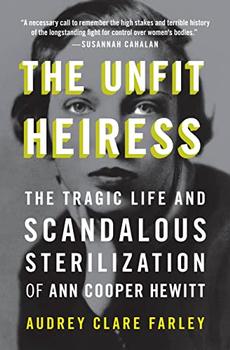Summary | Excerpt | Reviews | Beyond the Book | Read-Alikes | Genres & Themes | Author Bio

The Tragic Life and Scandalous Sterilization of Ann Cooper Hewitt
by Audrey FarleyThis article relates to The Unfit Heiress
In The Unfit Heiress, Audrey Clare Farley sets the case of San Francisco socialite Ann Cooper Hewitt against the backdrop of the American eugenics movement. In the age of eugenics, which lasted approximately from the 1920s to the 1940s, 30 states embraced laws allowing involuntary sterilization. North Carolina was one of the worst, partly because it continued its eugenics program into the 1970s, while eugenics had fallen out of favor in most states after World War II. The state sterilized over 7,000 people, including rape and incest victims, Black girls and poor white ones.
Latoya Adams, whose aunt, Deborah Blackmon, became a victim of sterilization in 1972, observed, "These people were dehumanized. They treated them like animals." The documents in Blackmon's file read: "Final diagnoses: Mental retardation, severe. Eugenic sterilization. Total abdominal hysterectomy." Blackmon was only 14 years old at the time.
In the late 1920s, when eugenic sterilizations began in North Carolina, support for the procedures was widespread. Supreme Court Justice Oliver Wendell Holmes wrote that it was "better for all the world if, instead of waiting to execute degenerate offspring for crime, or to let them starve for their imbecility, society can prevent those who are manifestly unfit from continuing their kind."
The North Carolina Eugenics Board was staffed by health and political professionals, including the state attorney general and the director of public health. The objective was layered: Sterilize to control welfare costs. Sterilize as a poverty management system. Sterilize to reduce Black families.
William Darity Jr., Gregory N. Price and Rhonda V. Sharpe co-authored a report about the racial motivations of sterilization focusing on the years 1958-1968: "Did North Carolina Economically Breed-Out Blacks During its Historical Eugenic Sterilization Campaign?" The paper explains that sterilizations increased as a control mechanism to eliminate certain populations. Darity Jr., Price and Sharpe were interested in "surplus populations," those dependent on the state. They found that sterilizations increased within surplus populations but only if those populations were Black.
The United Nations' definition of genocide includes imposing measures to prevent births within a group. Darity Jr., Price and Sharpe stated that "for blacks, eugenic sterilizations were authorized and administered with the aim of reducing their numbers in the future population—genocide by any other name."
Early in the sterilization program, Black women were protected because of their absence from state institutions and welfare benefits, a consequence of Jim Crow. Social workers didn't seek them out. But by the 1960s almost all the sterilized were Black women. Rutgers University historian Johanna Schoen, who studied records in North Carolina, said, "The North Carolina program reached into people's homes like no other." Schoen found cases of families moving away to avoid social workers' intrusiveness, and cases of children being hidden so the social workers wouldn't know the accurate size of a family.
Mecklenburg County sterilized three times more people than any other North Carolina county, a total of 465 from the years 1946-1968. Some of them technically gave permission for the procedure, but were coerced into doing so, including an illiterate woman who was told her welfare food supply would be cut off if she didn't sign an X on the sterilization form for her granddaughter, a rape victim.
In 2010, the North Carolina Office of Justice for Sterilization Victims was established to compensate victims with payment, but filing a claim requires documentation that not all victims may have access to. Additionally, reparations has been a sore subject within the state because many are resistant to opening the door to reparations for slavery.
Sterilization was a system of infantilization. Choices were taken away; adults were treated as children. North Carolina's sterilization system stopped in 1977 after a 40+ year history, but the scars and the trauma remain. A new century hasn't watered down the sins of the past in this Southern state, where women's biological futures were stolen from them.
Filed under People, Eras & Events
![]() This "beyond the book article" relates to The Unfit Heiress. It originally ran in June 2021 and has been updated for the
April 2023 paperback edition.
Go to magazine.
This "beyond the book article" relates to The Unfit Heiress. It originally ran in June 2021 and has been updated for the
April 2023 paperback edition.
Go to magazine.
Your guide toexceptional books
BookBrowse seeks out and recommends the best in contemporary fiction and nonfiction—books that not only engage and entertain but also deepen our understanding of ourselves and the world around us.